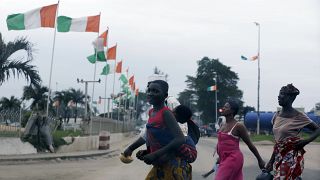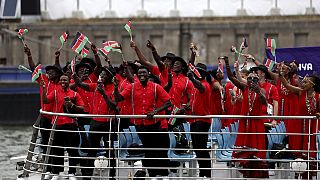Ivory Coast
Nigeria secured a spot in the Africa Cup of Nations (AFCON) semi-finals by defeating Angola with a solitary goal from Ademola Lookman. The Atalanta forward's precise finish came just before half-time, capitalizing on a brilliant build-up by Moses Simon.
This 1-0 victory marked Nigeria's third win of the tournament with Lookman as a key contributor.
Victor Osimhen's later goal was disallowed, and Nigeria's solid defensive record continued, keeping four consecutive clean sheets. Coach Jose Peseiro emphasized the team's defensive resilience and expressed satisfaction with their performance.
Nigeria, with a record 15th AFCON semi-final appearance, will face Cape Verde or South Africa in the next round.
Angola showcased resilience throughout the tournament, reaching the quarterfinals for the first time. Despite their efforts, Zini's missed opportunity before the hour mark and Nigeria's defensive strength ended their journey.
In the second match, DR Congo overcame Guinea 3-1 at the Ebimpe Olympic Stadium. Guinea initially took the lead with Mohamed Bayo's penalty, but DR Congo responded with goals from Chancel Mbemba, Yoane Wissa's penalty, and a stunning free-kick by Arthur Masuaku.
DR Congo, having drawn all group-stage matches, secured their semi-final berth. Coach Sebastien Desabre expressed joy at the crucial victory, and DR Congo will face either Mali or hosts Ivory Coast in the semi-finals.
The AFCON quarterfinals delivered thrilling encounters, setting the stage for intense semi-final clashes in Abidjan.
Football enthusiasts eagerly await the unfolding drama in this prestigious African tournament.













01:02
Pics of the day: July 23, 2024
01:07
Journalist exposes dire conditions in Makala prison
02:31
Cholera outbreak: Medical experts, government move to curb spread
11:10
Morocco under Mohammed VI : A model of African progress? [Business Africa]
02:14
Circus Baobab presents 'Yé!', a favorite at the Avignon Festival
00:58
UAE lifts 2022 visa ban on Nigerians